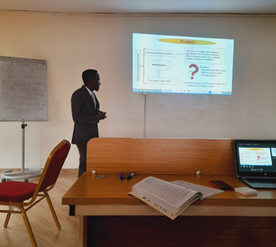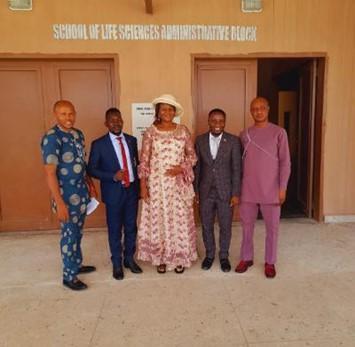While completing my bachelor’s program, I remember keeping my eyes up for a postgraduate opportunity. Soon my thirst for contributing to science become irresistible, triggering a “search and apply” lifestyle, with hope for a Master’s scholarship. Realizing the challenges associated with aquatic ecosystem functioning and management, I decided to strengthen my skills and make much effort in aquatic ecology. The scholarship offer letter from African Water Resources Mobility Network (AWaRMN), served as a step towards realizing my dream. I was pleased to be part of this mobility program, exploring both new lifestyle, people, culture, and mainly research environment in my host country, Nigeria. The 30th September 2021, my arrival in Nigeria opened a new page in my academic book! I was successfully admitted in Master’s of technology in Zoology (Applied Hydrobiology), at Federal University of Technology, Minna (FUTMINNA).
I had started my research journey at undergraduate, but AWaRMN scholarship provided a possibility for more scientific contributions. As hydrobiologist, I identified the water quality challenges. For my MSc research project, I focused on the use of macroinvertebrates as bioindicators of water quality. Firstly, I published a review article entitled “A review of the application of the Macroinvertebrate-based Multimetric Indices (MMIs) for water quality monitoring in lakes” in a Q1 Journal, environmental Science and Pollution Research (ESPR), on 19th May 2023 and can be accessed through https://doi.org/10.1007/s11356-023-27559-0. In addition, I developed MMI for lake ecological health monitoring in North-Central Nigeria based on macroinvertebrates. On 8th November, this newly developed and first lake macroinvertebrate-based MMI in Nigeria has been successfully published in Environmental Monitoring and Assessment. https://doi.org/10.1007/s10661-023-12036-5. The research finding emphasized the importance of macroinvertebrates as good bioindicators of aquatic health ecosystem monitoring. Further, I co-authored other research articles on (1) microplastics and their threats to macroinvertebrates in riverine ecosystems, (2) the distribution of planktons in fishing ponds in Minna, Nigeria; and (3) Review of development of self-sustaining fish farms and their economic importance.
The year 2023 has been academically successful for not only the peer-review articles published, but also an award of Master’s Degree in Zoology (Applied Hydrobiology), my long-term dream. Besides, I attended and presented one of my papers in 4th Annual Conference for Freshwater Biology Association of Nigeria (FBAN), at Usman Danfodiyo University, Sokoto state, Nigeria. My interest in research has always been sparked by the passionate mentors, lecturers, fellow students, and impacts/feedbacks from my previous works. Though I acknowledge the milestone reached so far, I feel like I am at the bottom of my journey to science. While waiting for my two publications in review of standard journals, I am also working on another manuscript addressing the knowledge gap on role of macrophytes in heavy metal uptake in lacustrine environment.

Gilbert presenting his research in conference

Gilbert (2nd left) after his Master’s thesis defence
Last Modified: Wed, 06 Dec 2023 11:10:06 SAST